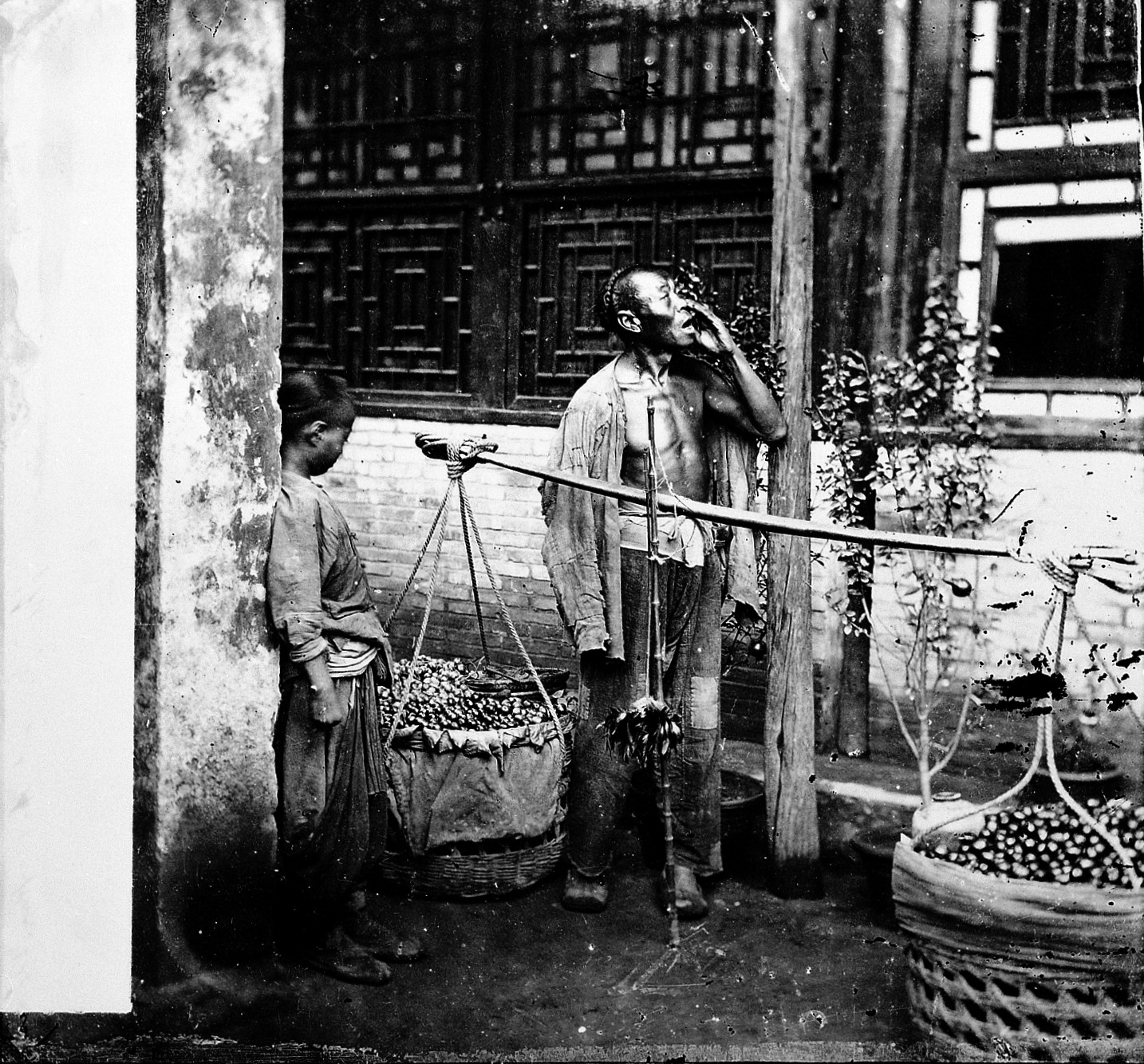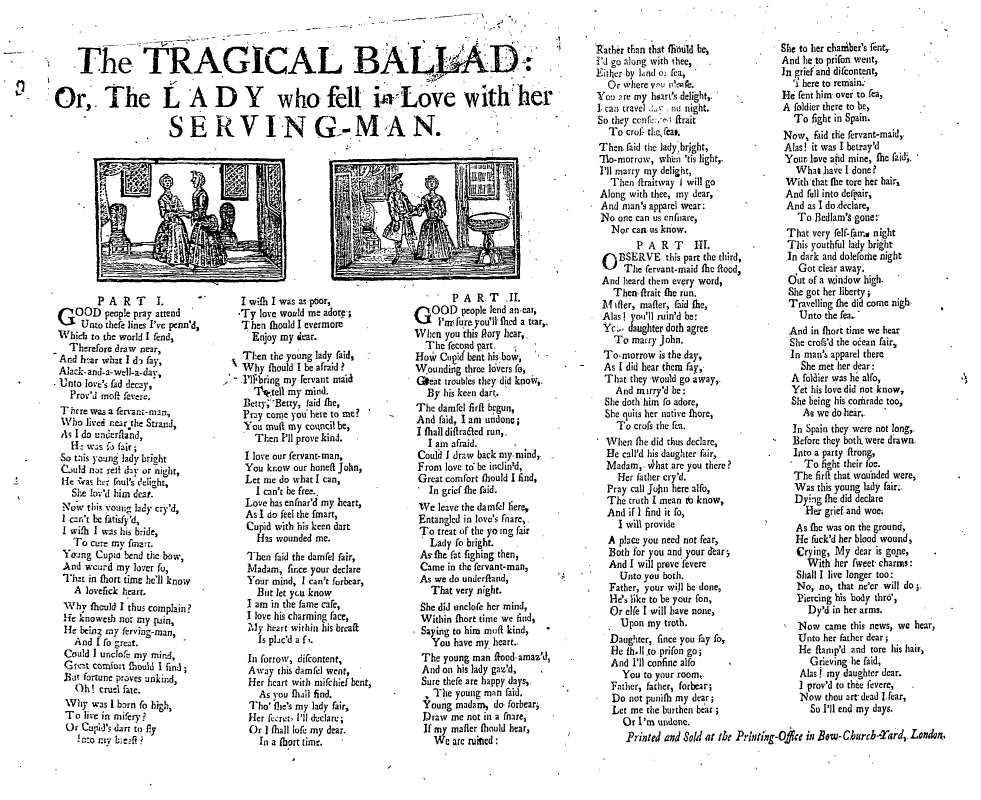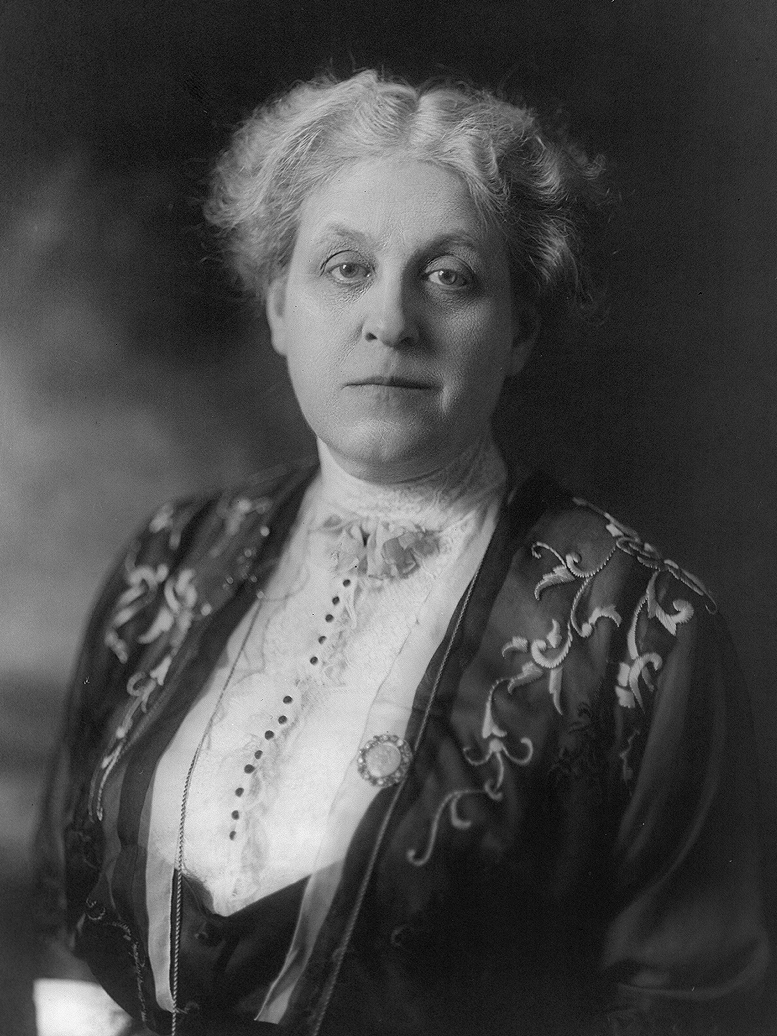|
Chapmen
A chapman (plural ''chapmen'') was an itinerant dealer or hawker in early modern Britain. Etymology Old English ''céapmann'' was the regular term for "dealer, seller", cognate with the Dutch ''koopman'' with the same meaning. Old English ''céap'' meant "deal, barter, business". The modern adjective ''cheap'' is a comparatively recent development from the phrase ''a good cheap'', literally "a good deal" (cf. modern Dutch ''goedkoop'' = cheap). The word also appears in names such as Cheapside, Eastcheap, Chepstow and the prefix Chipping: all markets or dealing places. The name of the Danish capital Copenhagen has a similar origin, being derived from ''Køpmannæhafn'', meaning "merchants' harbour" or "buyer's haven". By 1600, the word ''chapman'' had come to be applied to an itinerant dealer in particular, but it remained in use for "customer, buyer" as well as "merchant" in the 17th and 18th centuries. The slang term for man, "chap" arose from the use of the abbreviated word to ... [...More Info...] [...Related Items...] OR: [Wikipedia] [Google] [Baidu] |
Chapbook
A chapbook is a small publication of up to about 40 pages, sometimes bound with a saddle stitch. In early modern Europe a chapbook was a type of printed street literature. Produced cheaply, chapbooks were commonly small, paper-covered booklets, usually printed on a single sheet folded into books of 8, 12, 16 and 24 pages. They were often illustrated with crude woodcuts, which sometimes bore no relation to the text (much like today's stock photos), and were often read aloud to an audience. When illustrations were included in chapbooks, they were considered popular prints. The tradition of chapbooks arose in the 16th century, as soon as printed books became affordable, and rose to its height during the 17th and 18th centuries. Many different kinds of ephemera and popular or folk literature were published as chapbooks, such as almanacs, children's literature, folk tales, ballads, nursery rhymes, pamphlets, poetry, and political and religious tracts. The term "chapbook" for t ... [...More Info...] [...Related Items...] OR: [Wikipedia] [Google] [Baidu] |
Peddler
A peddler, in British English pedlar, also known as a chapman, packman, cheapjack, hawker, higler, huckster, (coster)monger, colporteur or solicitor, is a door-to-door and/or travelling vendor of goods. In England, the term was mostly used for travellers hawking goods in the countryside to small towns and villages. In London, more specific terms were used, such as costermonger. From antiquity, peddlers filled the gaps in the formal market economy by providing consumers with the convenience of door-to-door service. They operated alongside town markets and fairs where they often purchased surplus stocks which were subsequently resold to consumers. Peddlers were able to distribute goods to the more geographically-isolated communities such as those who lived in mountainous regions of Europe. They also called on consumers who, for whatever reason, found it difficult to attend town markets. Thus, peddlers played an important role in linking these consumers and regions to wider trade ... [...More Info...] [...Related Items...] OR: [Wikipedia] [Google] [Baidu] |
Cheapside
Cheapside is a street in the City of London, the historic and modern financial centre of London, which forms part of the A40 London to Fishguard road. It links St. Martin's Le Grand with Poultry. Near its eastern end at Bank junction, where it becomes Poultry, is Mansion House, the Bank of England, and Bank station. To the west is St. Paul's Cathedral, St Paul's tube station and square. In the Middle Ages, it was known as Westcheap, as opposed to Eastcheap, another street in the City, near London Bridge. The boundaries of the wards of Cheap, Cordwainer and Bread Street run along Cheapside and Poultry; prior to boundary changes in 2003 the road was divided amongst Farringdon Within and Cripplegate wards in addition to the current three. The contemporary Cheapside is widely known as the location of a range of retail and food outlets and offices, as well as the City's only major shopping centre, One New Change. Etymology and usage ''Cheapside'' is a common English s ... [...More Info...] [...Related Items...] OR: [Wikipedia] [Google] [Baidu] |
Broadside Ballads
A broadside (also known as a broadsheet) is a single sheet of inexpensive paper printed on one side, often with a ballad, rhyme, news and sometimes with woodcut illustrations. They were one of the most common forms of printed material between the sixteenth and nineteenth centuries, particularly in Britain, Ireland and North America because they are easy to produce and are often associated with one of the most important forms of traditional music from these countries, the ballad. Development of broadsides Ballads developed out of minstrelsy from the fourteenth and fifteenth century. These were narrative poems that had combined with French courtly romances and Germanic legends that were popular at the King’s court, as well as in the halls of lords of the realm. By the seventeenth century, minstrelsy had evolved into ballads whose authors wrote on a variety of topics. The authors could then have their ballads printed and distributed. Printers used a single piece of paper known as ... [...More Info...] [...Related Items...] OR: [Wikipedia] [Google] [Baidu] |
Early Modern Britain
Early modern Britain is the history of the island of Great Britain roughly corresponding to the 16th, 17th and 18th centuries. Major historical events in early modern British history include numerous wars, especially with France, along with the English Renaissance, the English Reformation and Scottish Reformation, the English Civil War, the Restoration of Charles II, the Glorious Revolution, the Treaty of Union, the Scottish Enlightenment and the formation and the collapse of the First British Empire. England during the Tudor period (1486–1603) English Renaissance The term, "English Renaissance" is used by many historians to refer to a cultural movement in England in the 16th and 17th centuries that was heavily influenced by the Italian Renaissance. This movement is characterised by the flowering of English music (particularly the English adoption and development of the madrigal), notable achievements in drama (by William Shakespeare, Christopher Marlowe, and Ben Jon ... [...More Info...] [...Related Items...] OR: [Wikipedia] [Google] [Baidu] |
Eastcheap
Eastcheap is a street in central London that is a western continuation of Great Tower Street towards Monument junction. Its name derives from ''cheap'', the Old English word for market, with the prefix 'East' distinguishing it from Westcheap, another former market street that today is called Cheapside. In medieval times, Eastcheap was the main meat market in the City of London, with butchers' stalls lining both sides of the street. It is also notable as the former location of Falstaff's Boar's Head Inn, featured in William Shakespeare's ''Henry IV, Part 1'' and '' Henry IV, Part 2''. History The history of Eastcheap dates back to Anglo-Saxon times. The name is first attested on an Anglo-Saxon penny of King Harold I (reigned 1035–1040) that was minted in London by the moneyer Eadwold between 1035 and 1037. The mint signature on the coin reads "EADǷOLD ONESTCEPLV" which is interpreted as "Eadwold on Estcep Ludene, meaning "Eadwold, on East Cheap, London". It is believed that ... [...More Info...] [...Related Items...] OR: [Wikipedia] [Google] [Baidu] |
Chipping (other)
Chipping may refer to: Places England Chipping is a prefix used in a number of place names in England, probably derived from , an Old English word meaning 'market', although the meaning may alternatively derive from (or via) the Medieval English word , meaning 'long market square'. It was sometimes historically spelled Chepying. * Chipping, Hertfordshire Chipping is a hamlet in the civil parish of Buckland in the East Hertfordshire district, in the county of Hertfordshire, England. Situated along the A10 road (which follows the course of the Roman Ermine Street), Chipping was an early, but unsu ... * Chipping, Lancashire * Chipping Barnet, Greater London (formerly Hertfordshire) * Chipping Campden, Gloucestershire * Chipping Norton, Oxfordshire * Chipping Ongar, Essex * Chipping Sodbury, Gloucestershire * Chipping Steps, Tetbury, Gloucestershire * Chipping Warden, Northamptonshire * Chepping Wycombe, Buckinghamshire Elsewhere * Chipping Norton, New South Wales, a suburb of Sy ... [...More Info...] [...Related Items...] OR: [Wikipedia] [Google] [Baidu] |
Copenhagen
Copenhagen ( or .; da, København ) is the capital and most populous city of Denmark, with a proper population of around 815.000 in the last quarter of 2022; and some 1.370,000 in the urban area; and the wider Copenhagen metropolitan area has 2,057,142 people. Copenhagen is on the islands of Zealand and Amager, separated from Malmö, Sweden, by the Øresund strait. The Øresund Bridge connects the two cities by rail and road. Originally a Viking fishing village established in the 10th century in the vicinity of what is now Gammel Strand, Copenhagen became the capital of Denmark in the early 15th century. Beginning in the 17th century, it consolidated its position as a regional centre of power with its institutions, defences, and armed forces. During the Renaissance the city served as the de facto capital of the Kalmar Union, being the seat of monarchy, governing the majority of the present day Nordic region in a personal union with Sweden and Norway ruled by the Danis ... [...More Info...] [...Related Items...] OR: [Wikipedia] [Google] [Baidu] |
Europeana
Europeana is a web portal created by the European Union containing digitised cultural heritage collections of more than 3,000 institutions across Europe. It includes records of over 50 million cultural and scientific artefacts, brought together on a single platform and presented in a variety of ways relevant to modern users. The prototype for Europeana was the European Digital Library Network (EDLnet), launched in 2008. The Europeana Foundation is the governing body of the service, and is incorporated under Dutch law as Stichting Europeana. History Europeana had its beginnings after a letter was jointly sent in April 2005 by Jacques Chirac, President of France, and the premiers of Germany, Spain, Italy, Poland and Hungary to the President of the European Commission, José Manuel Durão Barroso. It urged the creation of a virtual European library in order to make Europe's cultural heritage more accessible to everyone. The letter helped to give added support to work that the ... [...More Info...] [...Related Items...] OR: [Wikipedia] [Google] [Baidu] |
English Civil War
The English Civil War (1642–1651) was a series of civil wars and political machinations between Parliamentarians (" Roundheads") and Royalists led by Charles I ("Cavaliers"), mainly over the manner of England's governance and issues of religious freedom. It was part of the wider Wars of the Three Kingdoms. The first (1642–1646) and second (1648–1649) wars pitted the supporters of King Charles I against the supporters of the Long Parliament, while the third (1649–1651) saw fighting between supporters of King Charles II and supporters of the Rump Parliament. The wars also involved the Scottish Covenanters and Irish Confederates. The war ended with Parliamentarian victory at the Battle of Worcester on 3 September 1651. Unlike other civil wars in England, which were mainly fought over who should rule, these conflicts were also concerned with how the three Kingdoms of England, Scotland and Ireland should be governed. The outcome was threefold: the trial of and ... [...More Info...] [...Related Items...] OR: [Wikipedia] [Google] [Baidu] |
Chapman (name)
Chapman is an English surname derived from the Old English occupational name ''céapmann'' "marketman, monger, merchant", from the verb ''céapan, cypan'' "to buy or sell" and the noun form ''ceap'' "barter, business, purchase." Alternate spellings include Caepmon, Cepeman, Chepmon, Cypman(n), and Shapman. (By 1600, the occupational name ''chapman'' had come to be applied to an itinerant dealer in particular, but it remained in use for both "customer, buyer" and "merchant" in the 17th and 18th centuries. Modern chiefly British slang ''chap'' “man" arose from the use of the abbreviated word to mean a customer, one with whom to bargain.) The Oxford English Dictionary (OED) supplies four meanings for chapman, all of which pertain to buying and selling: 1) A man whose business was buying and selling; 2) an itinerant dealer who travels, also known as a hawker or peddler; 3) an agent in a commercial transaction; 4) a purchaser or customer. (N.B. A “petty chapman” was a retail deale ... [...More Info...] [...Related Items...] OR: [Wikipedia] [Google] [Baidu] |
Chapman (surname)
Chapman is an English surname derived from the Old English occupational name ''céapmann'' "marketman, monger, merchant", from the verb ''céapan, cypan'' "to buy or sell" and the noun form ''ceap'' "barter, business, purchase." Alternate spellings include Caepmon, Cepeman, Chepmon, Cypman(n), and Shapman. (By 1600, the occupational name ''chapman'' had come to be applied to an itinerant dealer in particular, but it remained in use for both "customer, buyer" and "merchant" in the 17th and 18th centuries. Modern chiefly British slang ''chap'' “man" arose from the use of the abbreviated word to mean a customer, one with whom to bargain.) The Oxford English Dictionary (OED) supplies four meanings for chapman, all of which pertain to buying and selling: 1) A man whose business was buying and selling; 2) an itinerant dealer who travels, also known as a hawker or peddler; 3) an agent in a commercial transaction; 4) a purchaser or customer. (N.B. A “petty chapman” was a retail deale ... [...More Info...] [...Related Items...] OR: [Wikipedia] [Google] [Baidu] |


_1.313_-_Cheapside_Cross%2C_as_it_appeared_in_1547.jpg)





